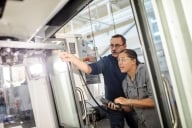You have /5 articles left.
Sign up for a free account or log in.
Before having children, my view of childhood was that growing up happened through a long, gradual series of changes. Children, through lots of practice and repetition, learned what they needed to know in life and slowly grew and changed into adults, growth spurts notwithstanding. At least when I thought about my own childhood this is how growing up seemed to have happened. Now that I’m a parent, though, I realize that what seemed like a gradual transition into adulthood was more like a series of many punctuated events that brought about abrupt shifts. Some of these were milestones, others simply a sudden change in the day-to-day routine.
While pregnant with our first child, I thought that the nine months of planning, check-ups, and deliberations would be a slow, gentle shifting of gears into parenthood. And while the planning was crucial, it didn’t prepare me for how suddenly life would change. Pregnancy wasn’t a gradual transition into parenthood; it was a stage in and of itself, which ended abruptly with the reality of birth. Becoming parents for the first time hurled us into another world (a glorious new world). And with a second child, I was fooled again into thinking that we understood exactly what life would be like: just do the same as we did for a single child, times two. Instead we were rocketed into a complex dimension where factors of two behave as exponentials.
Our first child led us into a false sense of confidence in our parenting preparations. A somewhat cautious boy, his transition to bipedalism was very gradual. It took him almost 6 months from pulling up, to supporting himself with a push-car, to finally letting go and walking independently. We falsely assumed this to be the norm. His younger sister’s transition, on the other hand was abrupt, and during a one-hour ferry ride she let go of the hand supporting her and went from baby to child in an instant. Suddenly she was at a new stage and our perceptions of her changed, while we scrambled to ensure our toddler safety measures were fully engaged.
Some shifts are seemingly minor, but mean a great deal for our kids. I taught my daughter to knit last year, and she was thrilled because it meant she could attend the lunchtime knitting club at school. The club is limited to older grades but when the school councilor who runs the club saw my daughter’s interest and proficiency she allowed her to join. It was a huge boost to my daughter’s confidence to be accepted by the group of older kids, and she almost instantly expanded her circle of friends, buoyed by the positive, supervised setting.
I’m finding my son’s transition into adolescence to be another series of sudden shifts, especially in his social life. Only a year ago he nervously attended his first school dance, where he stood in a corner with the other shy boys cracking jokes and eating potato chips. Now he and his buddy strut into the dances, full of confidence and even agree to slow-dance with girls. His internet sessions, once limited to online Minecraft sessions with his buddies, have recently expanded to include long Skype sessions with girls in his class he’d never talked about before. Our conversations about online behavior had involved hypothetical situations and setting limits that seemed easy to follow. Now the growing need for privacy makes it more difficult to enforce our simple rule that internet use happen only in public areas of the house, such as the living or dining room. It’s easy to feel like we haven’t had proper time to study what an ideal response might be, and we’re increasingly finding that as parents we have to think on our feet.
I continue to be fooled by our kids into thinking we’re on top of the changes in their lives. We track their growth with pencil marks on the wall, where we see a few jumps in height, but nothing too surprising. Everything feels under control. And then, bam! A new reality to get used to, which will shift yet again just as we wrap our heads around the current change.





